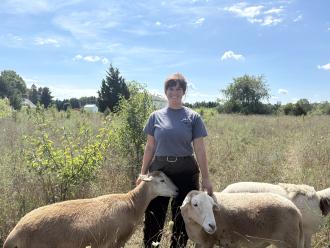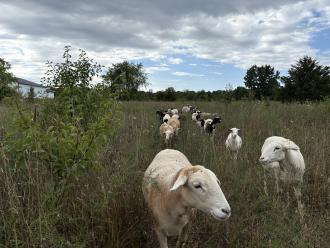A ewe-nique approach to sustainability
KALAMAZOO, Mich.—Driving along a quiet street in Kalamazoo, you might just miss the green iron gate off the road that guards a special kind of farm. Nestled between neighborhoods and tucked along a long dirt path, the farm is unassuming. It’s beautiful, with its green pastures, blue skies above, wildflowers, and honeybees buzzing about, but it seems empty.
That is, until Lauren Burns, B.S. ’12, gives a whistle, and you hear it before you see it. The stomping of hooves, a “baa” from the distance, and then, a flock of forty sheep come galloping towards you. This is no ordinary farm: this is Tending Tilth.
Tending Tilth is a contract sheep grazing business owned and operated by Burns, who earned her bachelor’s degree in biology in 2012. After graduation, she worked as a zookeeper at Binder Park Zoo in Battle Creek, and at Lincoln Park Zoo in Chicago.
Even as she was working with large exotic animals like gorillas and giraffes, her heart still belonged to conservation, and her interest in where food comes from began to grow. While interning on another sheep farm, she learned more about caring for a flock, contract grazing, and the key role it can play in supporting climate health. She was hooked—and formed Tending Tilth in 2018.
“I’d like to be able to show that you don’t have to have huge acreage for cattle...but you could have a small flock [of sheep] in five acres and you could be contributing to climate health and sequestering carbon,” Burns says.
Sheep grazing and conservation
Sheep grazing as an environmental stewardship practice is nothing new. But when Burns first started Tending Tilth, her business was one of the only ones in the region. Now, others are popping up around the state and country because the many benefits of this approach are clear.
Once hired for a project, Burns sets up solar-powered electric fences to corral the sheep, which keeps the sheep close together and safe from predators as they work across the terrain. She uses a method called “prescribed grazing,” meaning she evaluates the landscape each day and adjusts the sheep paddock sizes and placements to meet the needs of her flock, and to ensure that their grazing is sustainable at the local scale and also contributes to a healthy planet.
After the fence is installed, it’s time for the sheep to clock in. They get to work grazing, trampling, eating and naturally fertilizing the landscape. Once they have finished a section, Burns moves the electrified fence every two to three days, being careful not to overgraze the land. The result is not the perfectly striped lawn a mower would produce, but the approach offers far more, improving soil health and conserving the land.
A flock’s trampling aerates the soil, and prescribed grazing helps to build topsoil and to reduce invasive plant species. Sheep urine naturally irrigates the soil, and their manure attracts insects and birds, further developing a healthy ecosystem. Employing sheep reduces the need for carbon-powered mowing equipment, fertilizers and pesticides. Together, this helps sequester carbon and build soil health, leading to greater water infiltration and retention. And not only is it good for the environment, it’s also good for the sheep.
“I have not had to use any sort of dewormer or antibiotics since I started doing this type of grazing. [The sheep are] just healthy,” Burns says.
In the past, Tending Tilth flocks have grazed the residential properties of environmentally conscious individuals. But, with demand for her flocks ramping up, it is more challenging to meet the needs of smaller landowners. With her interest in promoting environmental conservation, Burns has decided to focus on larger-scale conservation projects. Right now, her flock is engaged in a long-term project with Southwest Michigan Land Conservancy, and other organizations interested in grassland and prairie restoration. In fact, the flock has even grazed on WMU’s campus, working with Consumer’s Energy on their solar site in the BTR park a few years ago.
Tending Tilth is also participating in soil health research. Burns, alongside Dr. Tara Kneeshaw, a professor of geology at Grand Valley State University, was awarded a Michigan Space Grant Consortium NASA Space grant in 2024 to study the effects of prescribed sheep grazing on soil health and ecosystems.
“We’re hoping to get more funding to continue the study. We are starting to see pretty good results in terms of soil health in the prescribed grazing areas,” Burns says. “We had a controlled area where no grazing had happened, and then where we’ve been grazing for two years, we are starting to see better microbial health in the soil.”
Mentoring the next generation
In addition to running the business, and caring for her flock, Burns is committed to shaping the next generation of conservationists, scientists and researchers. In 2023, she created the Tending Tilth internship program, providing internship opportunities to students from Kalamazoo Regional Education Service Agency (KRESA) and Kalamazoo College, and is interested in expanding the program.
“My internship program is what I am most proud of. I am so grateful to the interns who have worked with me and look forward to meeting the new crew each year,” she says. “I wanted to provide an opportunity for hands-on experience to students in the area. It feels good to introduce students to different forms of conservation, science, animal care, entrepreneurship and professional development.”
Each summer, she works with three student interns from Kalamazoo College, whose help she says is crucial in keeping the farm up and running during the busy grazing season. In return, the interns gain hands-on experience in soil science, animal husbandry, sustainable agriculture and more.
“I also have a different internship program with K-RESA’s veterinary science program. With this program, I have high school seniors work with me during lambing season, so they get hands-on experiences like birth and labor, blood, ear-tagging, all that stuff, before they go off to veterinary school. It’s a good way for them to learn if this is the career they want to pursue before heading off to college” Burns says.
Burns also collaborates with WMU’s Hydrogeology field camp program each summer. Students from across the U.S. attend the six-week program, gaining hands-on experience and learning the skills needed for careers in the geosciences. The Tending Tilth interns work alongside the field camp students, while they learn to install monitoring wells, collect and test water samples and inspect soil cores. The program is a win-win for both Tending Tilth and emerging hydrogeologists.
With every step across the pasture, Burns is cultivating more than just healthy soil. She is also ensuring a future where conservation and community go hand in hand.
To learn more about Tending Tilth, visit their website at https://tendingtilth.com/.
For more WMU news, arts and events, visit WMU News online.



